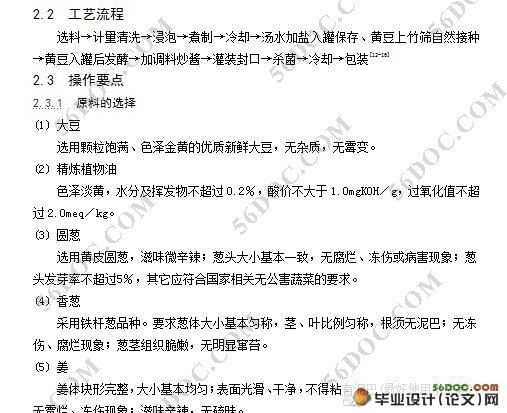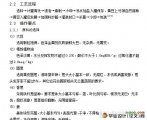风味黄豆酱加工工艺研究(8300字)
摘 要:本试验以大豆为主要原料,研究了黄豆自然发酵中黄豆的煮制时间、发酵温度和发酵时间对风味的影响及风味黄豆酱的最佳配方,主要有食盐添加量、糖的添加量、生姜添加量、大蒜添加量等。期望其结果可以对实现传统黄豆酱的工业化、安全化生产提供一定理论基础。结果表明:选取优质大豆浸泡6h后高压煮制2h,黄豆沥水捞出,平铺于竹筛上置于35℃的环境中自然发酵6天,入罐后发酵,暴晒几天后即可制得风味独特的黄豆酱。取适量黄豆酱,按以下配方炒酱后冷却即为成品。风味酱最佳配方:黄豆酱,食盐8%,白糖10%,生姜20%,大蒜4%,植物油30%,辣椒片2%,圆葱30%,香葱30%,芝麻1%,变性淀粉1.5%,鲜味剂2%,天然调味剂适量,稳定剂适量(注:调味料均按黄豆酱质量的百分比添加,非成品总质量)。
关键词:自然发酵;黄豆酱;风味
Study on the Professing of Soybean Paste
Abstract:This experiment taking soybean as the main raw material, result of soaked, cooking, starter-making, fermentation and relish. This test studied in the influence of natural fermented soybeans cooked time, fermentation temperature and fermentation time in flavor and the best formula of soybean paste flavor. The best formula mainly include salt additives, sugar additives, ginger additives,garlic additives and act. I hope the results can be expected to provide certain theoretical basis in realizing the industrialization of the traditional soybean paste and secure production. The result shows: select high-quality soybean cooked 2 hours after soaking 6 hours and then bails out the soybean. Tile the soybean in bamboo sieve, then put it under the environment of 35 Celsius for 6 hours, and then put it into porcelain pot. After insolate two days, unique flavor soybean paste is done. Apply adequate amount soybean paste, according to the following formula to fry cause, and the end product is done after cooling. Best formula: Yellow fish with soya sauce, salt 8%, sugar 10%, ginger 20%, garlic 4%, vegetable oil 30%, pepper slices 2%, onion 30%, shallot 30%, sesame 1%, modified starch 1.5%, flavoring agent 2%, natural flavoring q.s, stabilizing agent q.s(Spice add in accordance with the percent of yellow fish with soya sauce).
Key words:Natural fermentation; Soybean paste; Flavor

目 录
摘要…………………………………………………………………………………………1
关键词………………………………………………………………………………………1
1 前言………………………………………………………………………………………2
2 材料与方法………………………………………………………………………………3
2.1 材料……………………………………………………………………………………3
2.1.1 试验原料……………………………………………………………………………3
2.1.2 主要试剂……………………………………………………………………………3
2.1.3 主要器材……………………………………………………………………………3
2.2 工艺流程………………………………………………………………………………4
2.3 操作要点………………………………………………………………………………4
2.3.1 原料的选择…………………………………………………………………………4
2.3.2 计量清洗……………………………………………………………………………5
2.3.3 浸泡…………………………………………………………………………………5
2.3.4 煮制…………………………………………………………………………………5
2.3.5 冷却…………………………………………………………………………………5
2.3.6 汤水入罐保存、黄豆自然接种……………………………………………………5
2.3.7 黄豆入罐后发酵……………………………………………………………………5
2.3.8 加调料炒酱…………………………………………………………………………5
2.4 试验设计………………………………………………………………………………5
2.4.1 黄豆煮制时间的筛选试验…………………………………………………………5
2.4.2 制曲温度的选择……………………………………………………………………5
2.4.3 制曲时间的选择……………………………………………………………………6
2.4.4 煮制时间、制曲温度、制曲时间的最佳组配……………………………………6
2.4.5 风味酱最佳配方的筛选试验………………………………………………………6
2.4.5.1 食盐添加量的筛选………………………………………………………………7
毕业设计(论文)网: http://www.56doc.com
2.4.5.2 白糖添加量的筛选………………………………………………………………7
2.4.5.3 生姜添加量的筛选………………………………………………………………7
2.4.5.4 大蒜添加量的筛选………………………………………………………………7
2.5 检验项目与方法………………………………………………………………………7
2.5.1 感官指标……………………………………………………………………………7
2.5.2 理化、卫生指标……………………………………………………………………8
3 结果与分析………………………………………………………………………………8
3.1 黄豆煮制时间的确定…………………………………………………………………8
3.2 制曲温度的确定………………………………………………………………………9
3.3 制曲时间的确定………………………………………………………………………9
3.4 煮制时间、制曲温度、制曲时间的最佳组配的确定………………………………9
3.5 风味酱最佳配方的确定………………………………………………………………10
3.5.1 食盐添加量的确定…………………………………………………………………10
3.5.2 白糖添加量的确定…………………………………………………………………10
3.5.3 香葱添加量的确定…………………………………………………………………10
3.5.4 大蒜添加量的确定…………………………………………………………………10
3.5.5 最佳方案的确定……………………………………………………………………11
4 产品的质量指标…………………………………………………………………………12
4.1 感官指标………………………………………………………………………………12
4.2 理化、卫生指标………………………………………………………………………12
5 结论与讨论………………………………………………………………………………12
5.1 结论……………………………………………………………………………………12
5.2 发展前景………………………………………………………………………………12
参考文献 …………………………………………………………………………………13
致谢…………………………………………………………………………………………14
|



